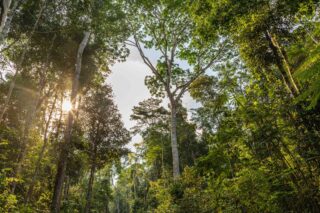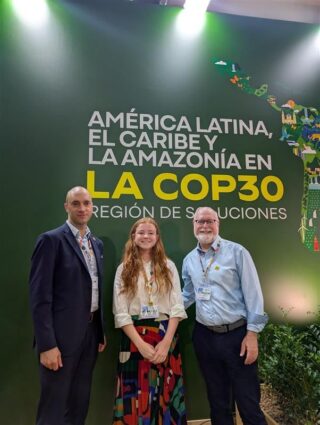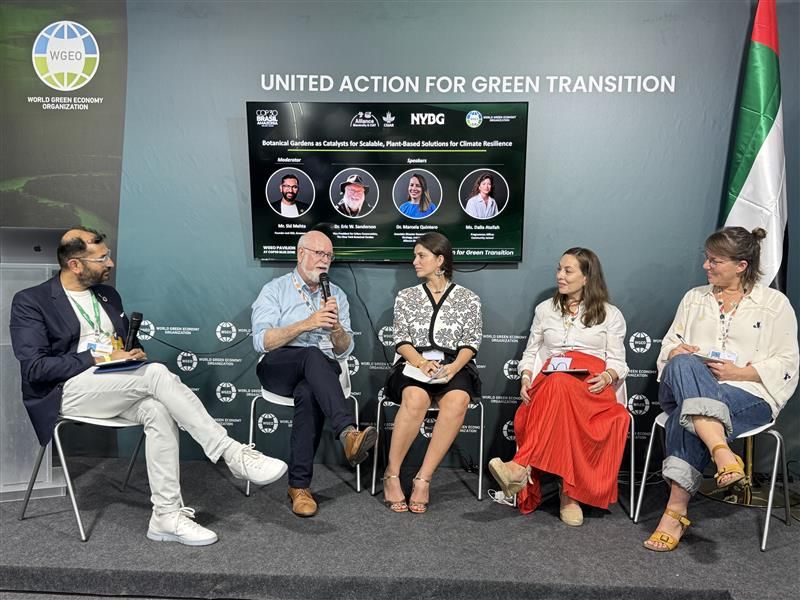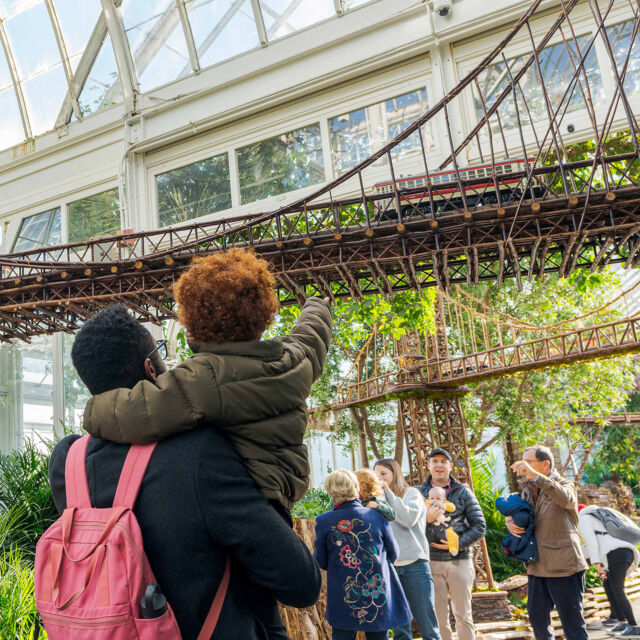Why Botanical Gardens Matter in Global Climate Policy: NYBG at COP30 in Belém, Brazil
By Luis Calzadilla, Senior Director of External Relations and Engagement, NYBG and Elena Garofalo, Associate Vice President of Foundation Relations, NYBG

When the world gathered in Belém do Pará, Brazil, for COP30—the United Nations Climate Change Conference—the New York Botanical Garden (NYBG) arrived with a clear and urgent mission: to make unmistakably clear that plants and fungi must be at the heart of global climate solutions. Represented by a multidisciplinary delegation, NYBG elevated the voice of science and conservation ensuring that the world’s plant and fungal diversity is foundational to the dialogue shaping the future of climate policy.

Emma Grover with Dr. Eric Sanderson and Professor Alexandre Antonelli, Executive Director of Science at Royal Botanic Gardens, Kew.
As a world-class botanical garden, NYBG understands that climate change and biodiversity loss are interconnected crises. At COP30, we participated in both NYBG-led and partner events, reaffirming that alliances matter now more than ever. Collaboration is key to scaling solutions that protect ecosystems and communities.
Our colleagues, Dr. Eric Sanderson and Emma Grover, contributed to two pivotal sessions:
- Growing Green Solutions: Botanical Gardens as Catalysts for Scalable, Plant-Based Solutions for Climate Resilience
Hosted in partnership with The Alliance of Bioversity and CIAT, this event explored how botanical gardens can drive nature-based solutions to strengthen climate resilience worldwide.
- Nurturing Nature: The Role of Botanical Gardens in Climate Resilience
Co-organized with CAF—Development Bank of Latin America—and the Royal Botanic Gardens, Kew, this session highlighted the unique role of botanical gardens in bridging science, policy, and practice.
In both discussions, we emphasized a simple truth: botanical gardens are not just places of beauty—they are hubs of scientific knowledge and innovation, essential for guiding climate action.
One of the defining features of COP30 was the active participation of Indigenous and local communities. There was no better setting than the Amazon to recognize their leadership in conserving forests and biodiversity. At NYBG, incorporating Indigenous knowledge is integral to our scientific mission, which can be seen reflected in our long-standing research collaborations and community partnerships in places such as Vanuatu, the Brazilian Amazon, Colombia, Myanmar, Peru, and other countries across the globe. At COP30, NYBG proudly amplified this message while showcasing our scientific contributions through our cross-cutting initiatives:
- Plants for Climate Resilience
- Food Plants: A Global Conservation Priority
- Artificial Intelligence: Unlocking the Power of Plants and Fungi

Growing Green Solutions Panelists Dr. Eric Sanderson, Dr. Marcela Quintero, Ms. Dalia Atallah, Gry Bossen, and moderator Sid Mehta (left).
These initiatives reflect NYBG’s Science Strategy, and our commitment to applying cutting-edge science to real-world challenges—ensuring that plant knowledge informs climate strategies at every level.
Our presence at COP30 reinforced an essential truth: plants and fungi are not peripheral to climate action; they are indispensable in driving effective solutions.
From carbon sequestration to food security, they offer scalable, science-backed and sustainable solutions that directly support both mitigation and adaptation efforts. We reaffirmed that as a botanical garden with global reach and deep local roots, NYBG and our partners are uniquely positioned to translate rigorous research into practical solutions that work for communities and ecosystems alike.
COP30 may well be a defining moment in the global climate agenda. Participating in this global forum was more than an opportunity—it was a responsibility to elevate the science and voices sometimes overlooked in climate negotiations and action. Through bilateral meetings, expert panels, interviews, and networking events, NYBG championed the message that plant science and the expertise housed in botanical gardens are essential to addressing the climate challenges that lie ahead. NYBG will build on the momentum of COP30 by continuing to advocate for nature-based solutions that strengthen resilience, protect biodiversity and secure a sustainable future for all.
SUBSCRIBE
Enter your email address to subscribe to this blog and receive updates on new posts.











